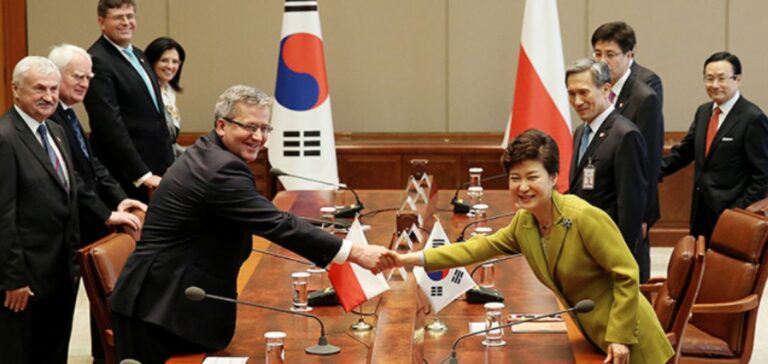Poland and South Korea strengthen their energy partnership with nuclear power agreements, driving Poland’s green energy transition. Approximately 350 officials from both countries attended an event during the visit of South Korean President Yoon Seok-yeol to Poland. These Memorandums of Understanding (MoUs) primarily focused primarily on nuclear power generation, emphasizing Poland’s ambition to strengthen its energy infrastructure.
Advancing Poland’s Nuclear Energy Agenda: Commitment, Collaboration, and Sustainable Solutions
The signed MoUs between Doosan Enerbility and Polish companies highlight Poland’s commitment to new nuclear power plants. These agreements align with efforts to diversify energy and reduce reliance on fossil fuels. To further these initiatives, Poland’s Ministry of State Assets, South Korea’s MOTIE, ZE PAK, PGE, and KHNP signed a letter of intent. This agreement aims to advance their collective efforts. This milestone sets the stage for the second nuclear power plant in Pątnów. The plant will feature Korean-supplied APR1400 reactors with a capacity of 2800 MWe.
To expand cooperation, Hyundai Engineering Company (HEC) partnered with Grupa Azoty Zakłady Chemiczne Police SA and the USA’s Ultra Safe Nuclear Corporation (USNC). Their collaboration hence focuses on advancing Poland’s nuclear energy agenda. The partnership focuses on harnessing USNC’s Micro-Modular Reactor (MMR) technology. The partnership aims to apply this technology in the chemical industry and construct small modular reactors (SMRs). It also focuses on utilizing emission-free nuclear energy for hydrogen production. This collaboration signals Poland’s determination to explore sustainable and clean energy solutions.
Revolutionizing Poland’s Energy Landscape: Collaboration, Innovation, and Sustainable Solutions
In a significant development, Grupa Azoty Police, USNC, and the West Pomeranian University of Technology have recently signed an agreement to establish a state-of-the-art nuclear energy research facility in the town of Police. This cutting-edge facility, located in northwestern Poland, will serve as a hub for advancing USNC’s MMR technology. Furthermore, it reinforces the country’s position as a major player in the nuclear energy sector.
Mariusz Grab, President of the Management Board of Grupa Azoty Police, lauded the collaboration, highlighting its potential to revolutionize the chemical industry. Echoeing this sentiment, HEC CEO Hyeon-Sung Hong, emphasized the strategic value of partnering with Grupa Azoty Group and USNC. Grupa Azoty is a prominent player in Poland’s fertiliser and chemical sector, while USNC is a leader in micro modular reactor technology. Leveraging their collective expertise, the collaboration aims to accelerate the establishment of a sustainable and eco-friendly energy landscape in Poland.
The event surrounding President Yoon Seok-yeol’s visit has not only underscored the mutual commitment of South Korea and Poland to strengthening energy cooperation but has also set the stage for groundbreaking advancements in nuclear power generation. With a focus on green energy and sustainable solutions, these collaborative efforts are poised to shape Poland’s energy landscape. They pave the way for a greener and more sustainable future in the country.






















